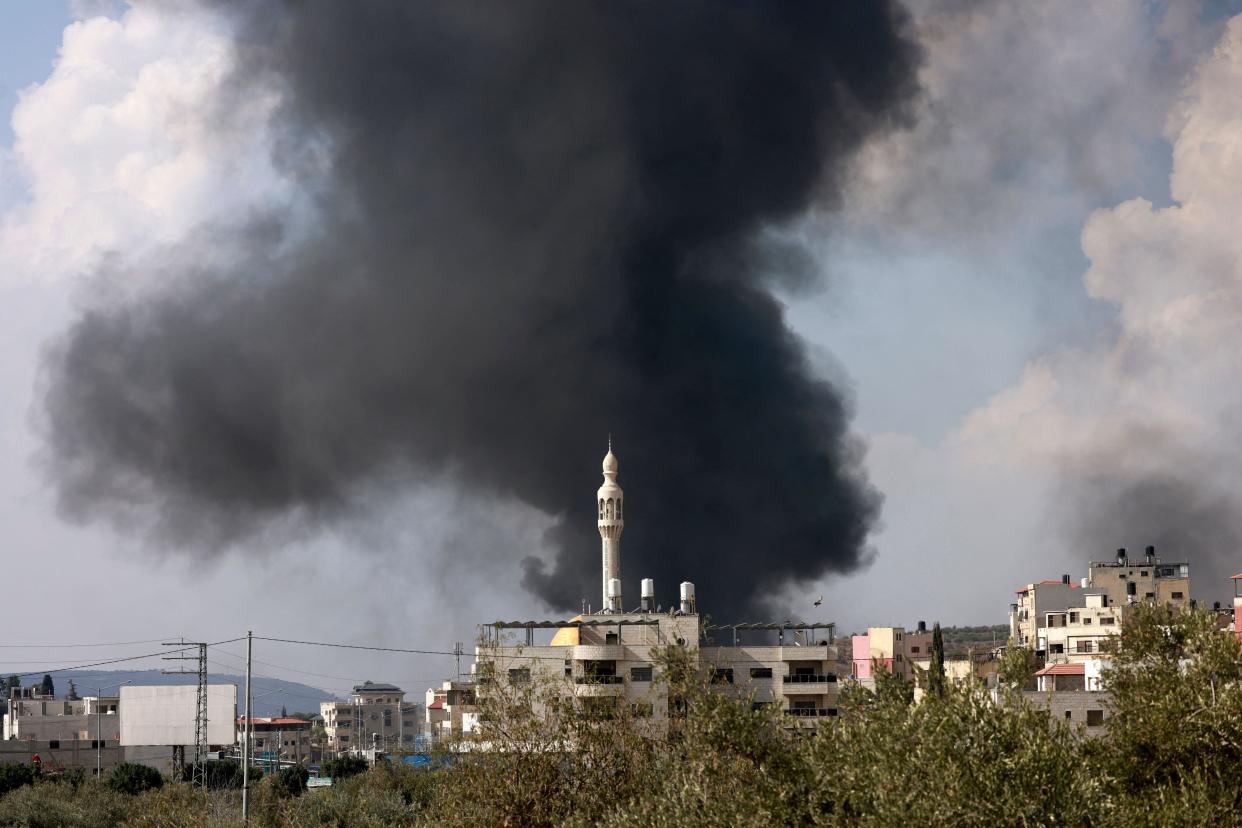Israel Must Loudly Arrest the Settlers Who Are Killing West Bank Palestinians

- Oops!Something went wrong.Please try again later.
- Oops!Something went wrong.Please try again later.
At a press conference in Tel Aviv on Friday, U.S. Secretary of State Antony Blinken said Israeli leaders assured him they would condemn the wave of violence against Palestinians by Jewish settlers in the West Bank. Good. But that is not nearly enough.
Since Hamas’ Oct. 7 attack, settlers there have killed more than 120 Palestinians and injured at least 2,000. They have forcibly expelled more than 800 Palestinians from their homes, blown up their generators and solar panels, and burned down tents of Bedouin herders.
Again: This has been going on not in Gaza but in the West Bank—which is governed by the Palestinian Authority, not by Hamas. Some of those killed were members of militant groups, but most were attacked simply because they were Palestinians. In any case, they had nothing to do with Hamas’ attack on Israel from Gaza.
Back on Oct. 25, President Joe Biden warned that the wave of attacks in the West Bank was “pouring gasoline” on the tensions unleashed by the war, saying, “It has to stop.” The killers “have to be held accountable.”
Yet Israeli officials have since said nothing about the settlers’ violence, not even after at least one incident where settlers attacked Israeli soldiers who were trying to stop their crimes.
Blinken arrived in Tel Aviv on Friday to reiterate that the United States supports Israel’s right to defend itself—but also to insist, more forcefully than before, on three things. First, Israel must order a “humanitarian pause” in the fighting, so that food and medical aid can enter Gaza and so that hostages can be released. (Prime Minister Benjamin Netanyahu refused, saying Hamas has to release hostages before a pause.) Second, Israel must do more to minimize civilian casualties in its otherwise justifiable fight against Hamas. (So far, not so good. Sen. Chris Murphy, one of Israel’s most supportive Democrats, issued a statement Friday, calling the level of casualties “unacceptable and unsustainable.”) Third, Israel must hold the violent settlers “accountable.” (We shall see.)
Though Blinken didn’t spell out precisely what this means, at least not at his press conference, it should mean this: The settlers should be arrested and, where appropriate, charged with serious crimes, including murder. Those arrests and charges should be very publicly announced by law-enforcement authorities. Netanyahu should very publicly endorse the arrests. The trials should be publicized, even broadcast, worldwide.
Israeli officials must do all this in part for Israel’s own sake—vigilante groups cannot be allowed to go on rampages in a democratic country—but, even more, to dissociate the Israeli government from these killings, to make clear that it does not equate Palestinians with Hamas and that it is committed to protecting innocent Palestinians in the West Bank.
If officials do not do this, then they are asking for the world to conclude that they do endorse (or at least don’t much mind) the settlers’ killings, that they draw no distinction between Palestinians and terrorists.
There is a great moral distinction between Israel and Hamas. Israel at least warns civilians before dropping bombs; Hamas does nothing to protect its own subjects from those bombs and even deploys them as human shields. Israel’s targets are not Palestinian people per se, even when their airstrikes (disproportionately and unforgivably) kill quite a few; Hamas leaders say that the aim of the Oct. 7 raid was to kill as many Jews as possible and that their ultimate aim is to wipe the state of Israel off the map.
However, if the Israeli government does not denounce, arrest, and prosecute the settlers who have killed Palestinians in the West Bank, then its officials should feign no surprise when more Palestinians are radicalized; when still larger numbers of people elsewhere—who already criticize Israel’s airstrikes in Gaza as a “disproportionate” response to Hamas’ Oct. 7 attack—come to view Israel (or at least this Israeli government) as a criminal enterprise; when, in short, they, justly or not, draw moral equivalences between Israel and Hamas.
Netanyahu and his government are not doing a good job at rebutting the notion. Earlier this week, Tzvi Succot was appointed head of the Israeli parliament’s subcommittee that deals with settlements in the West Bank. Succot is a prominent and ardent settlement activist who, before coming to parliament, was arrested at least three times for violence against Palestinians and whose views are so radical that the Israeli army rejected him as “unsuitable” for military service.
According to the United Nations, about 700,000 Jewish settlers live in the West Bank—up from 520,000 a decade ago, and the number continues to rise. From January to July, Netanyahu’s right-wing government approved more than 13,000 permits for new houses in the settlements.
Violence by settlers and by Palestinians has erupted in the West Bank, ever since Israel occupied the territory after the 1967 war, but it has intensified in the month since Hamas’ attack. Before then, there was, on average, one incident of violence a day; now there are seven.
The 1,400 Israelis who were murdered on Oct. 7 should not be conflated with the settlers on the West Bank. The villages and kibbutzim where Hamas’ attack took place, near the Gazan border, were established long before 1967—in many cases, even before the state of Israel was founded in 1948. The victims and their families were natives to the land, not colonialist intruders.
Many commentators who misread history do not recognize this distinction either. Unless the Israeli government condemns, arrests, and prosecutes the settlers who committed crimes in the West Bank, the misreading of history will seem justified.

